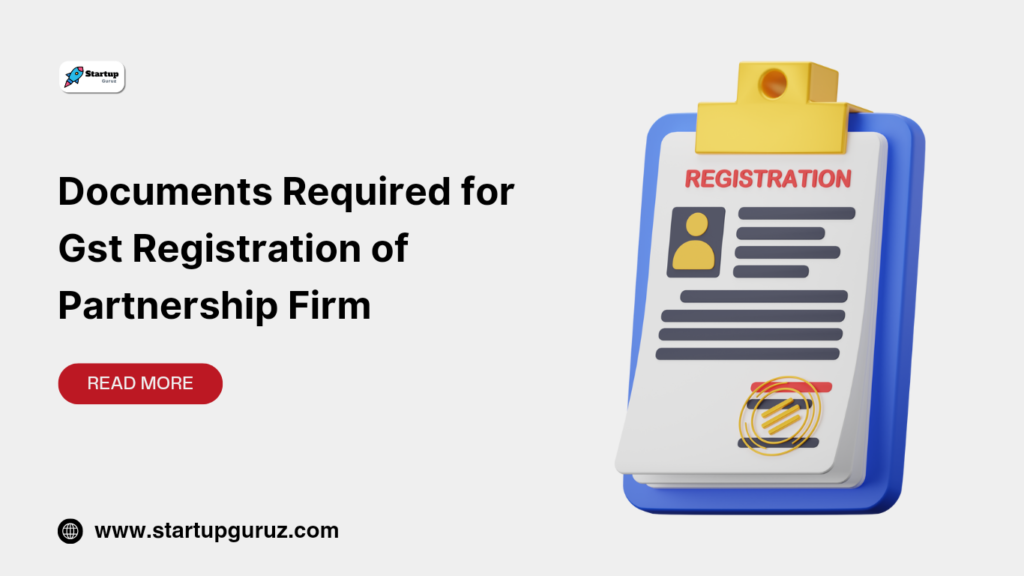Documents Required for Gst Registration of Partnership Firm
Documents Required for GST Registration of Partnership Firm:
GST registration is crucial for partnership firms to comply with tax regulations. Here’s a detailed guide on the necessary documents and FAQs regarding GST registration for partnership firms.

Introduction:
GST (Goods and Services Tax) is a unified indirect tax system in India. Every business entity, including partnership firms, needs to register for GST to ensure compliance with tax laws. The GST registration process involves submitting specific documents to the tax authorities.
Documents Required for GST Registration of Partnership Firm:
- PAN Card of the Partnership Firm:
- A copy of the PAN card is essential for identity verification.
- Proof of Business Registration:
- Partnership Deed: A notarized copy of the partnership deed is required. It should include information about the partners and their shares in the business.
- Registration Certificate: If the partnership firm is registered, a copy of the registration certificate must be provided.
- Identity and Address Proof of Partners:
- Aadhaar Card and Passport-sized Photographs: Each partner must provide their Aadhaar card and passport-sized photographs.
- Proof of Place of Business:
- Rental/Lease Agreement: If the business premises are rented, a copy of the rental/lease agreement is needed.
- Utility Bill: A recent electricity bill or property tax receipt with the name of the owner is required for address verification.
- Bank Account Details:
- A canceled cheque or bank statement that displays the firm’s name, address, and IFSC code.
- Authorization Letter:
- An authorization letter signed by all partners, authorizing a designated partner for GST registration.
FAQs for GST Registration of Partnership Firm:
1. Is GST registration mandatory for partnership firms?
Yes, GST registration is mandatory for partnership firms with an aggregate turnover exceeding the prescribed threshold limit.
2. Can a partnership firm use a residential address for GST registration?
Yes, a partnership firm can use a residential address for GST registration. The utility bill or property tax receipt serves as proof of the address.
3. What is the penalty for not obtaining GST registration?
Failure to obtain GST registration can lead to penalties and legal consequences. Penalties may include a percentage of the tax due or a specified amount for each day of non-compliance.
4. Can a partnership firm register multiple business verticals under one GST registration?
Yes, a partnership firm can register multiple business verticals under a single GST registration, simplifying compliance.
5. How long does it take to complete the GST registration process?
The GST registration process typically takes 7-10 working days from the date of submission of all required documents.
6. Can a partnership firm voluntarily cancel its GST registration?
Yes, a partnership firm can apply for voluntary cancellation of GST registration if it ceases to carry on its business or there is any change in the constitution.
7. Are there any exemptions for small-scale businesses regarding GST registration?
Small-scale businesses with an aggregate turnover below the prescribed limit may be exempt from GST registration, but it’s advisable to check the latest exemption thresholds.
8. What is the validity period of GST registration for a partnership firm?
GST registration is valid as long as the partnership firm continues to carry on its business and complies with GST rules and regulations.
9. Can a partnership firm apply for GST registration online?
Yes, the GST registration process for partnership firms can be completed online through the official GST portal.
10. Is it necessary to physically visit the GST office for registration?
In most cases, physical visits to the GST office are not required. The entire GST registration process, including document submission, can be done online.
Conclusion:
Obtaining GST registration for a partnership firm is a crucial step to ensure legal compliance and seamless business operations. By understanding the required documents and frequently asked questions, partnership firms can navigate the GST registration process with confidence.